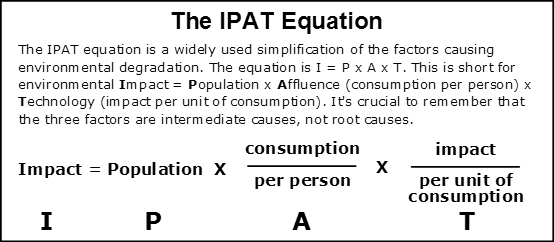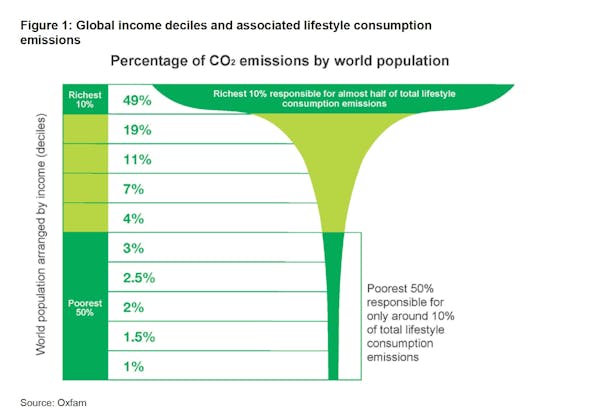Malthusian Theory
Thomas Malthus was an English doctor and philosopher, born in England in 1766. His “An Essay on the Principle of Population” proposed that population growth eventually will place catastrophic pressure on resource use - leading to famines, conflict, and other stress. Malthus suggested that population pressures lead to resource overuse, famine and misery, in particular, because exponential population growth outstrips food production. He argued that famine and misery in turn lead to vice (such as theft).
Driven by some of the pressing issues of his day, Malthus was particularly interested in connecting the predicament of England’s poor to these issues of resources use and proposed imposing restrictions on the poor, suggesting that the poor practice sexual abstinence. Malthus took issue with England’s Poor Laws (a kind of welfare system for those unable to work). He argued that supporting the poor with social welfare only postponed the inevitable famine and conflict and placed undue pressure on the rest of society. He argued that the laws (social security) simply exacerbate the predicament of the poor by enabling the population to increase even more and requiring even more food to feed even more poor people. He argued that the poor should be left to starve to prevent environmental catastrophe.
Excerpts from An Essay on the Principles of Population, Chapter 1:
I.14
I think I may fairly make two postulata.
First, That food is necessary to the existence of man.
Secondly, That the passion between the sexes is necessary and will remain nearly in its present state.
I.17
Assuming then, my postulata as granted, I say, that the power of population is indefinitely greater than the power in the earth to produce subsistence for man.
I.18
Population, when unchecked, increases in a geometrical ratio. Subsistence increases only in an arithmetical ratio. A slight acquaintance with numbers will shew the immensity of the first power in comparison of the second.
I.19
By that law of our nature which makes food necessary to the life of man, the effects of these two unequal powers must be kept equal.
I.22
This natural inequality of the two powers of population, and of production in the earth, and that great law of our nature which must constantly keep their effects equal, form the great difficulty that to me appears insurmountable in the way to the perfectibility of society. All other arguments are of slight and subordinate consideration in comparison of this. I see no way by which man can escape from the weight of this law which pervades all animated nature. No fancied equality, no agrarian regulations in their utmost extent, could remove the pressure of it even for a single century. And it appears, therefore, to be decisive against the possible existence of a society, all the members of which, should live in ease, happiness, and comparative leisure; and feel no anxiety about providing the means of subsistence for themselves and families.
Excerpts from Chapter 5:
V.1
The positive check to population, by which I mean, the check that represses an increase which is already begun, is confined chiefly, though not perhaps solely, to the lowest orders of society.
V.3
To remedy the frequent distresses of the common people, the poor-laws of England have been instituted; but it is to be feared, that though they may have alleviated a little the intensity of individual misfortune, they have spread the general evil over a much larger surface. It is a subject often started in conversation and mentioned always as a matter of great surprise, that notwithstanding the immense sum that is annually collected for the poor in England, there is still so much distress among them….
V.10
The poor-laws of England tend to depress the general condition of the poor in these two ways. Their first obvious tendency is to increase population without increasing the food for its support. A poor man may marry with little or no prospect of being able to support a family in independence. They may be said therefore in some measure to create the poor which they maintain; and as the provisions of the country must, in consequence of the increased population, be distributed to every man in smaller proportions, it is evident that the labour of those who are not supported by parish assistance, will purchase a smaller quantity of provisions than before, and consequently more of them must be driven to ask for support.
V.27
Notwithstanding, then, the institution of the poor-laws in England, I think it will be allowed, that considering the state of the lower classes altogether, both in the towns and in the country, the distresses which they suffer from the want of proper and sufficient food, from hard labour and unwholesome habitations, must operate as a constant check to incipient population.
V.28
To these two great checks to population, in all long occupied countries, which I have called the preventive and the positive checks, may be added vicious customs with respect to women, great cities, unwholesome manufactures, luxury, pestilence, and war.
Neo-Malthusian Thought and Arguments against Overpopulation
Overpopulation is the idea that there are not enough resources on the earth to sustain the earth’s population. Key to this idea is that there are certain human needs that must be filled, and that there are finite resources to fulfill these needs. You might notice that many of the ideas and language Malthus uses resonates with discussions of population, food, and poverty heard in the press today. Malthus’ ideas gained renewed interest in the 1960s and 1970s with the publication of Paul Ehrlich’s The Population Bomb which revisited Malthus’ prediction that overpopulation would outpace food production, resulting in catastrophe. The ideas presented in these works conceive of resources as finite. This viewpoint begets discussions of resource scarcity, as it assumes that there are limits to the capacity of nature to produce or supply resources. .
Many scholars have taken issue with these ideas, in particular pointing out that human needs can be met by multiple forms, that needs can be a product of social pressures (do you need Doritos to satisfy your hunger? or an iPhone to have human interaction?), and human ingenuity and technological fixes have helped us adapt ways to meet our needs. Humans are not just parasites on the natural environment. This mindset fails to account for the ways humans modify the environment to increase production. Overpopulation arguments tend to place blame on the poor for having too many babies and not consider over consumption by wealthy that are fueled by artifact colonial regime structures.
The Impact-Population Affluence-Technology (IPAT) equation is used to highlight that it is not just population that matters, but also, affluence or consumption and technology. The equation identifies three factors which contribute to environmental impacts (I): population (P), affluence / consumption (A), and technology (T). Typically, the equation is expressed as seen in the image below.

Overpopulation:
Watch this film to better understand population growth, changing birth rates, demographic transitions and poverty (the content might be on your quiz this week).
When we think about population we also need to think about consumption.

OPTIONAL ADDITIONAL MATERIAL:
- Peter Menzel's photo journal "Hungry Planet Family Food Portraits" is a great visual documentation of how important consumption (A) is in therm of environmental impacts.
- Eric Holt-Gimenez's article "We Already Grow Enough Food For 10 Billion People -- and Still Can't End Hunger" is a good start to thinking about the "doubling food production by 2050" discourse.
- The Population Research Institute’s videos on “Overpopulation is a Myth”, Episodes 1-6 may also be helpful. These videos are short, only a few minutes each.